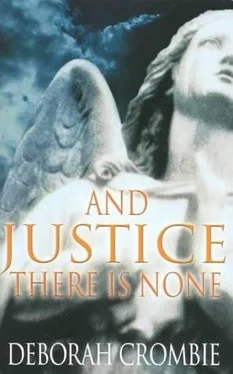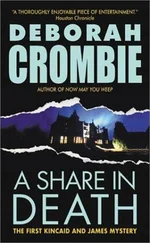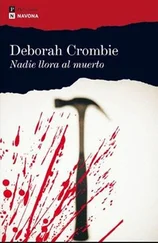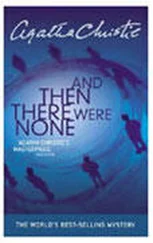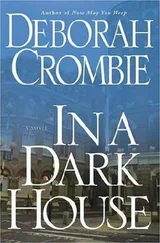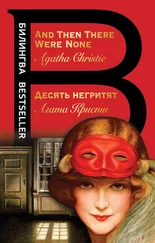The man who came to the door was in his fifties, graying, slightly heavyset, and dressed in shirt and tie as if he had just come back from an ordinary Sunday church service.
"Mr. Smith?" asked Gemma, showing her warrant card. "We'd like to talk with you and your wife, if you feel up to it."
The man nodded without speaking and led them through into the sitting room, saying, "Joanie, it's the police." Sorrow was palpable in the air. A Christmas tree in the corner and a string of cards across the mantel seemed cruelly and inappropriately cheerful.
Dawn's mother rose from the sofa, and Kincaid saw that she had been looking through a photo album. Kincaid could see that until yesterday Joan Smith might have had a shadow of her daughter's beauty; her thinness might have been expressed as elegance. But grief had sucked her dry, left her gaunt and brittle and looking more than her age.
"Have you found him?" she demanded. "The monster that killed our daughter?"
"No, Mrs. Smith, I'm sorry. I know this must be difficult for you, but we hoped you could tell us a bit about Dawn." Gemma was at her most gentle, and Kincaid was content to listen, and watch. "Could we sit down?" Gemma asked, and Mrs. Smith sank obediently back to the sofa, clutching the photo album. Kincaid saw that the crowded room was filled with pictures of Dawn from babyhood on, an adored only child.
"Could you tell us when you last saw your daughter?" Gemma directed the question towards them both, but it was the mother who answered.
"Two weeks ago. She came for Sunday lunch. She didn't often come on a weekend, because he didn't like it, but he was away on some sort of a business trip."
"Karl didn't like your daughter to visit you?" Gemma clarified, her brow creased in a frown.
"Weren't good enough, were we? Clarence manages a supermarket, and does a good job of it, but that meant nothing to Karl Arrowood. He wanted nothing to do with us."
Her husband sat beside her, watching her, and every so often he gave a slow, wounded shake of his head as she spoke, as if he were depending on her to express what he could not.
"Do you know that he never came here once? And we were never invited to their house? Not even for Christmas or holidays! Oh, Dawn would make excuses, saying he'd planned a business dinner, or that they had to go to France or to some posh country house. And she'd promise the next time would be different, but we learned she didn't mean it, that Karl would never allow it. He took our daughter away from us, and now she's dead."
"How did she meet Karl?"
"At some swank London party. She'd taken a job at the BBC, her and her friend Natalie, and they were living the high life. She'd come home and tell me about it in those days, what everyone was wearing, what was served, the latest gossip.
"We couldn't believe it at first, when she said she was going to marry this man twice her age. But we thought, well, she's a grown woman, we'll make the best of it, and at least he can afford to give her a proper wedding." Mrs. Smith pinched her lips together in renewed anger.
"But he didn't?"
"Took her away. To Nice or some such. We never even had a photo." She hugged the album to her chest, as if that lack created a physical void. "And now he's planned her funeral without consulting us. We'd thought to have a service at the crematorium here, where she grew up, where our friends and neighbors could come. But, no, he's arranged it all. A burial, in Kensal Green, on Tuesday."
"I suppose he does have that right, as her husband," said Gemma. "And as you say, he can afford it. But it does seem insensitive of him not to take your feelings into account."
Dawn's mother nodded and sniffed, as if gratified by Gemma's support.
"Did Dawn seem any different the last time you saw her?"
Mrs. Smith looked at her husband as if seeking confirmation. "Now that you mention it, she did. Sweeter, I guess you could say. She even hugged us when she left, and our Dawn was never a demonstrative girl. It seemed to me- I told Clarence so that day, didn't I?" She didn't wait for a response, but went on, "It seemed to me that she was apologizing somehow."
"Did your daughter ever talk to you about children?"
"No. She knew how we felt, though. She was an only child. If she didn't give us grandchildren, we'd have nothing. Not that he would have let us see them," she added bitterly.
"Did Dawn tell you that Karl didn't want children?"
"No, but we suspected as much. After all, they had been married for five years…"
"Mrs. Smith…" Gemma hesitated. She didn't wish to cause Dawn's parents further distress, but she knew they had a right to know. "Your daughter was expecting a baby. She'd just had the pregnancy confirmed that afternoon."
"Oh, no," the woman whispered. "Not that, too. How could someone take that away from her- from us?" She fastened her gaze on Gemma. "Did he know?"
"Karl? He says not. Mrs. Smith, did you ever have reason to think Karl mistreated your daughter?"
"You mean, did he hit her?" Mrs. Smith's surprised expression seemed to indicate that this was one evil she hadn't attributed to her son-in-law. "No. She never… You're not thinking she told him about the baby and he-"
"We haven't ruled out any possibilities at this time," Kincaid told her. "Do you think your son-in-law could have-"
"No." Mr. Smith drew himself up, his mouth working in agitation. "No one who knew Dawnie could have done such a thing. And besides, the man was too… clean. You can't imagine him mussing his hands, or his shirt. Do you see what I mean?"
"I think so, yes," Kincaid answered soothingly. "Mrs. Smith, did Dawn have friends other than Natalie that she kept in touch with?"
"No. Natalie was her closest friend. It was only that kept him from driving them apart."
"And Dawn didn't mention anything else to you, something worrying her, or someone new in her life?"
"No." Mrs. Smith's eyes glistened with unshed tears, as if the lack of her daughter's confidences had added to her grief.
Gently, Gemma said, "If you remember anything else, Mrs. Smith, just give us a ring. We won't disturb you any further." She gave both parents her card, and thanked them.
But when she and Kincaid reached the car, she said, "You know, if Karl did abuse Dawn, she'd have kept it from her parents at all costs. To tell them, or let them see it, would have been to admit what a mistake she'd made."
***
Gemma arrived at work on Monday morning to find a copy of the previous day's Daily Star prominently displayed in the center of her desk. The headline screamed, "Slasher Strikes a Second Time in the Heart of Notting Hill."
"Bloody hell," she muttered as she skimmed the lurid account of Marianne Hoffman's and Dawn Arrowood's murders. "I'm going to kill the man."
"Had you not seen it, boss?" asked Melody Talbot, who had been passing by her office door. "I brought you my copy- thought you might want to have this MacCrimmon bloke drawn and quartered."
"It wouldn't do any good. The Hoffman case didn't attract all that much notice, but the record was available. All MacCrimmon had to do was put two and two together, and he's obviously quite adept at that. But I had hoped we could keep the details on the Arrowood case out of the papers for a few days."
"The throat-cutting went round the neighborhood like wildfire. I suppose the press were bound to latch on to it."
"Yes, but Tom MacCrimmon wouldn't have printed a rumor without some confirmation. Someone in the department must have given him the nod. I've heard he's free with the drinks." Gemma peered at the paper again. "There are similarities in the two cases, I have to admit." She'd spent the previous evening going over the Hoffman file. "But I'm not convinced that the Arrowood murder was random."
Читать дальше
